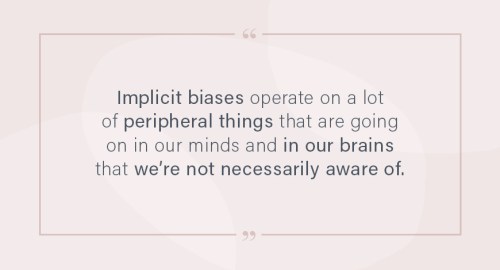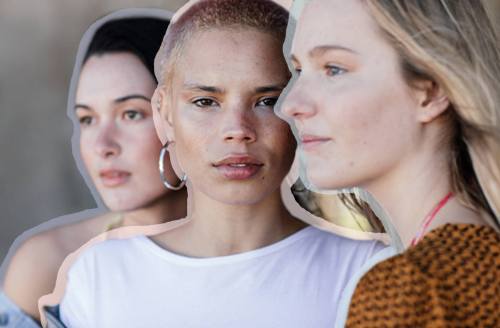No one wants to believe they have biases or are bigoted against other human beings. And yet, scientific research tells us that prejudice is built into who we are on a neurological level from the moment we begin interacting with the world, whether or not we’re aware of it. (To be clear though, this is not an excuse to discriminate. But more on that later.)
Implicit bias is the preferred term for “unconscious bias” among psychologists, and in its most basic definition, the Perception Institute—whose mission is to create solutions to reduce discrimination—notes it occurs “when we have attitudes towards people or associate stereotypes with them without our conscious knowledge.” For example, studies show that white people tend to associate black individuals with criminality without being consciously aware of the link. And voters have been found to undervalue female candidates in elections (ugh).
“Being socialized in American culture means that when people encounter a person from [a minority or marginalized] group, that association might spring to mind automatically.” —psychologist David Amodio, PhD
“Even if a person doesn’t consciously endorse these ideas, the fact that they experience the associations by being socialized in American culture means that when they encounter a person from [a minority or marginalized] group, that association might spring to mind automatically in the head,” says David Amodio, PhD, a professor of psychology and neuroscience at New York University whose work focuses on behavioral regulation. “It can bias their judgment a little bit—even if they don’t realize they’re having this thought.”
Below, Dr. Amodio explains how these biases are formed, and what we can all do to override them on a day-to-day basis.
Check out a psychologist’s advice for treating everyone equally despite your prejudices (because yeah, you have them).

What causes implicit biases to form?
According to Dr. Amodio, these biases likely don’t come from individual experiences with people of specific races, genders, sexual orientations, or socioeconomic groups. Rather, they stem from cultures and institutions that create stereotypes and biases about whole groups of people. “Especially in America, there’s a history of oppression and discrimination of African Americans and also toward Latinos and other minority groups,” he says. “When you’re perceiving the face of a person, and there are stereotypes about this person being threatening based on their racial-group membership, it’s possible that you might subtly perceive them to be a little more threatening than they really are.”
Neurologically speaking, a biased reaction happens in two main parts of the brain: the amygdala, which controls our flight-or-flight response, and the fusiform cortex, which detects human faces. “The brain is managing a lot of things that we’re not aware of at any given moment. Implicit biases operate on a lot of peripheral things that are going on in our minds and in our brains that we’re not necessarily aware of,” Dr. Amodio says.
Beyond unintentionally perceiving people as threats, biases can also prompt us to simply like certain people more than others. A 2001 study from the International Journal of Obesity, for instance, tasked 84 medical professionals who treat obesity to with completing an association test. They used the terms “fat” or “skinny,” for classification and further subjectively differentiated using two qualifiers: good or bad, and motivated or lazy. The results showed that the doctors overwhelmingly exhibited an anti-fat or pro-thin bias.
So…how do we make sure biases don’t dictate our actions?
If a way to rewire our prejudices does exist, psychologists haven’t found it yet. “That’s the million-dollar question for a lot of us,” Dr. Amodio tells me. Even though you can’t blot out the inequities in your mind, he does say it’s possible to consciously “override” the ideas—and doing so is probably your best bet for being as fair as possible. “Instead of undoing these associations of the mind, we have to make sure these biases don’t influence our behavior,” he says. “Oftentimes, that requires people to detect when there might be a bias. It’s then important to figure out how to best act fairly.”
“Instead of undoing these associations of the mind, we have to make sure these biases don’t influence our behavior.”
In practice, Dr. Amodio’s advice means adding another level of self-awareness to the way you interact with people. Plus, it’s important to keep in mind that behavioral discrimination doesn’t just happen on a macro scale: Micro-aggressions (verbal and nonverbal communication that reflects negative biases about the group as a whole) can also add up in a big way. So, just in case you needed another reminder to take a breath before you say something, consider this your cue.
The holidays are just around the corner, so here’s how to navigate the difficult convos that will no-doubt arise at your Thanksgiving dinner. And what to make of those awkward silences.
Sign Up for Our Daily Newsletter
Get all the latest in wellness, trends, food, fitness, beauty, and more delivered right to your inbox.
Got it, you've been added to our email list.











